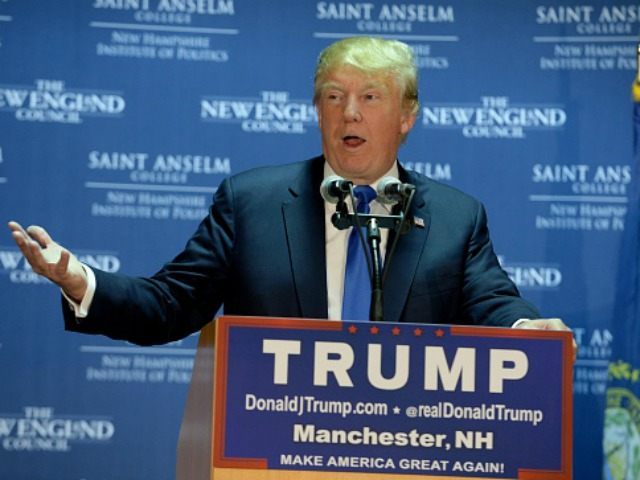GOP frontrunner Donald Trump says that, if elected, he would close the loopholes in the federal privacy law to ensure that students’ personal information remained private.
During an event in Manchester called “Politics and Eggs,” Trump was asked by Ann Marie Banfield, grassroots parent activist and education liaison for Cornerstone Action, about the student data mining that is associated with the Common Core standards.
The audience broke into applause when Banfield thanked Trump for his outspoken opposition to the now highly unpopular Common Core standards. Trump noted that his rival, former Florida Gov. Jeb Bush “is a big Common Core person.”
“How does anybody favor Common Core?” Trump asked.
But Banfield went further, observing to Trump that neither the GOP presidential candidates nor the media have been discussing one of the essential components of Common Core: the data mining of student personal information.
Banfield explained that the Obama administration gutted the FERPA (Family Education Rights and Privacy Act of 1974) law, thereby allowing private student and family information to leave the school without parental consent.
“Isn’t this ridiculous?” Trump responded, “You could have local education, with local people, and local schools, and you don’t have a problem. But some bureaucrat in Washington just wants to make money. I didn’t know Common Core was so complicated.”
“What would you do to protect the privacy of students now that Obama has pretty much opened that up and anybody can get that private information?” Banfield asked further. “Would you close the loophole in the FERPA law?
“He opened that up for everybody but himself,” said Trump. “When you think about it. That’s very interesting.”
“I would close all of it,” Trump replied. “You have to have privacy. You have to have privacy. So I’d close all of it. But, most of all, I’d get everything out of Washington, ‘cause that’s where it’s all emanating from.”
“Unfortunately this important issue on student privacy has been left out of the presidential debates, and too many parents are going ignored by the media so I was pleased to be able to ask Donald Trump about his support for student privacy,” Banfield tells Breitbart News. “I’d like to hear more details but at this point I think parents would be happy if this student privacy was addressed more in the primary.”
In a paper titled “Cogs in the Machine: Big Data, Common Core, and National Testing,” published by the Boston-based Pioneer Institute, authors Emmett McGroarty, Joy Pullmann, and Jane Robbins explain the reason for the Obama administration’s desire to place a “condition” of student data collection upon states when they applied for 2009 federal stimulus money in Race to the Top applications:
Federal law prohibits USED [U.S. Education Department] from maintaining a national student database… Since the absence of a national database impedes efforts to track citizens and manage the economy by manipulating the workforce, the federal government has for years been building the statutory structure to evade this prohibition. In fact, the law that essentially created the federal role in education also called for databases to monitor compliance with federal law in exchange for federal funds… The federal structure now incentivizes states to build identical—and therefore sharable—data systems, enabling a de facto national database.
McGroarty, education director at American Principles Project (APP), observed to Breitbart News in January, “The stimulus bill has allowed for aggressive data mining through a regulatory rewrite of FERPA.”
As McGroarty and his colleagues wrote, FERPA “prohibits the disclosure of students’ personally identifiable information (PII), by federal, state, or local education entities, without written consent of the student or his parents…”
However, in 2013, FERPA was essentially gutted by the Obama administration, thus enabling schools to release a child’s record to child welfare agencies without the consent of parents. In some cases, a child’s information may be released without even informing parents.
“Parents may not sue a school that discloses their child’s PII in violation of FERPA,” the report’s authors write, adding:
Under the new regulations, an “authorized representative” designated to receive students’ PII, without consent, can be literally anyone – another government… a foundation or other private nonprofit organization, a research group, an individual, or a for-profit company… As long as the data was released in connection with an audit or evaluation of a federal or state-sponsored “education program,” parental consent would not be required before the release…
“By the time it launched its No Child Left Behind waiver effort, the Obama administration for the most part had its data-collection pieces underway,” McGroarty said.
Though another Trump rival, Sen. Marco Rubio, has stated his opposition to the Common Core standards and federal intervention in K-12 education, he has also said he wants to be the “Vocational Education president.” Rubio is a co-sponsor of the Student Right to Know Before You Go Act, a measure that would “amend the Higher Education Act of 1965 to update reporting requirements for institutions of higher education and provide for more accurate and complete data on student retention, graduation, and earnings outcomes at all levels of postsecondary enrollment.”
With Rubio’s ambivalent stance on immigration, his emphasis on vocational workforce development, and his interest in student data, he earned only a grade of “C” in August on the Common Core Report Card published at The Pulse 2016 by American Principles in Action.
“It is troubling that Rubio advocates a limited role for government in the activities of the American people, yet fails to see the problem with the governmental tracking and collecting data on all citizens,” McGroarty wrote at The Pulse.

COMMENTS
Please let us know if you're having issues with commenting.